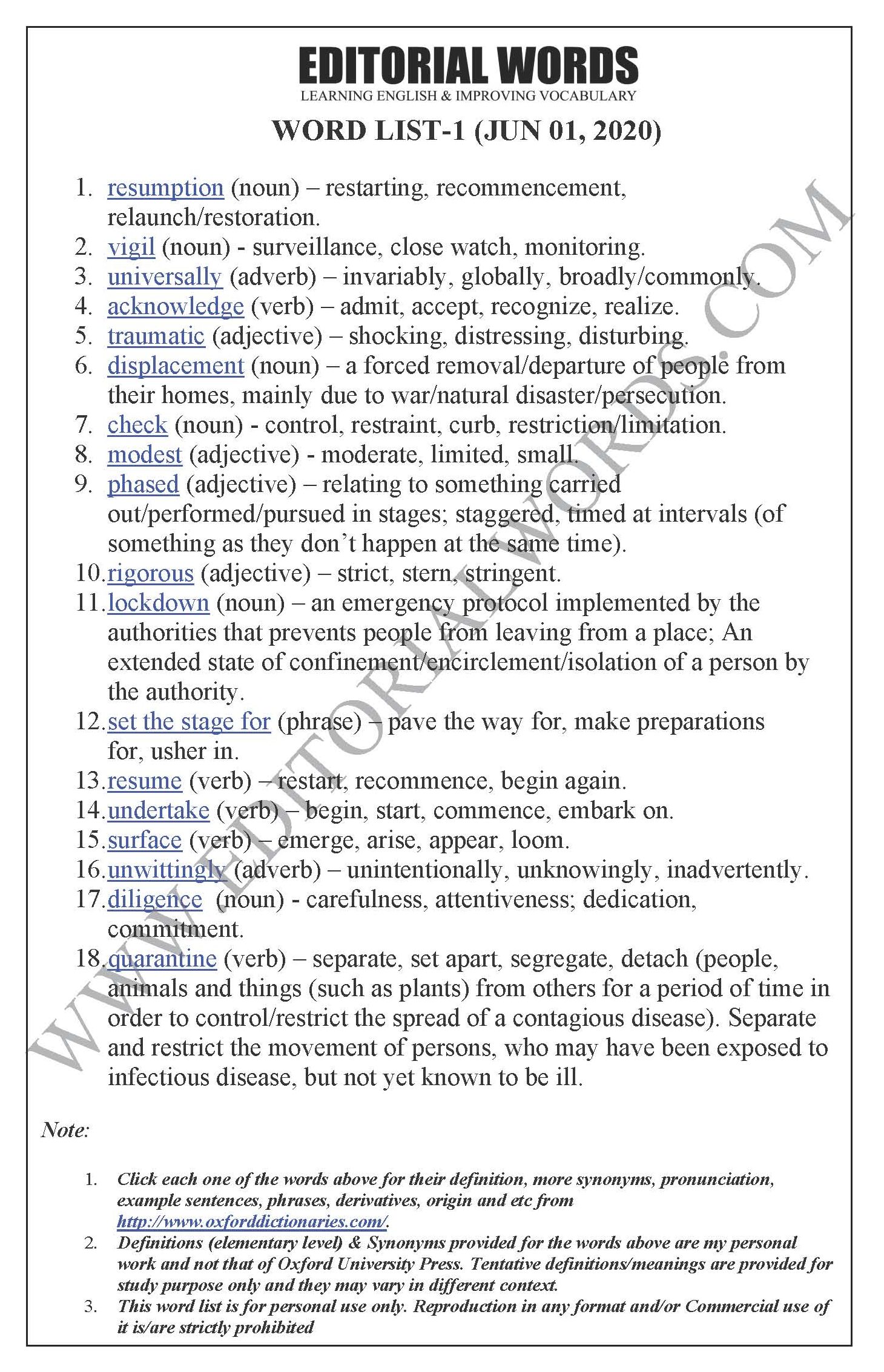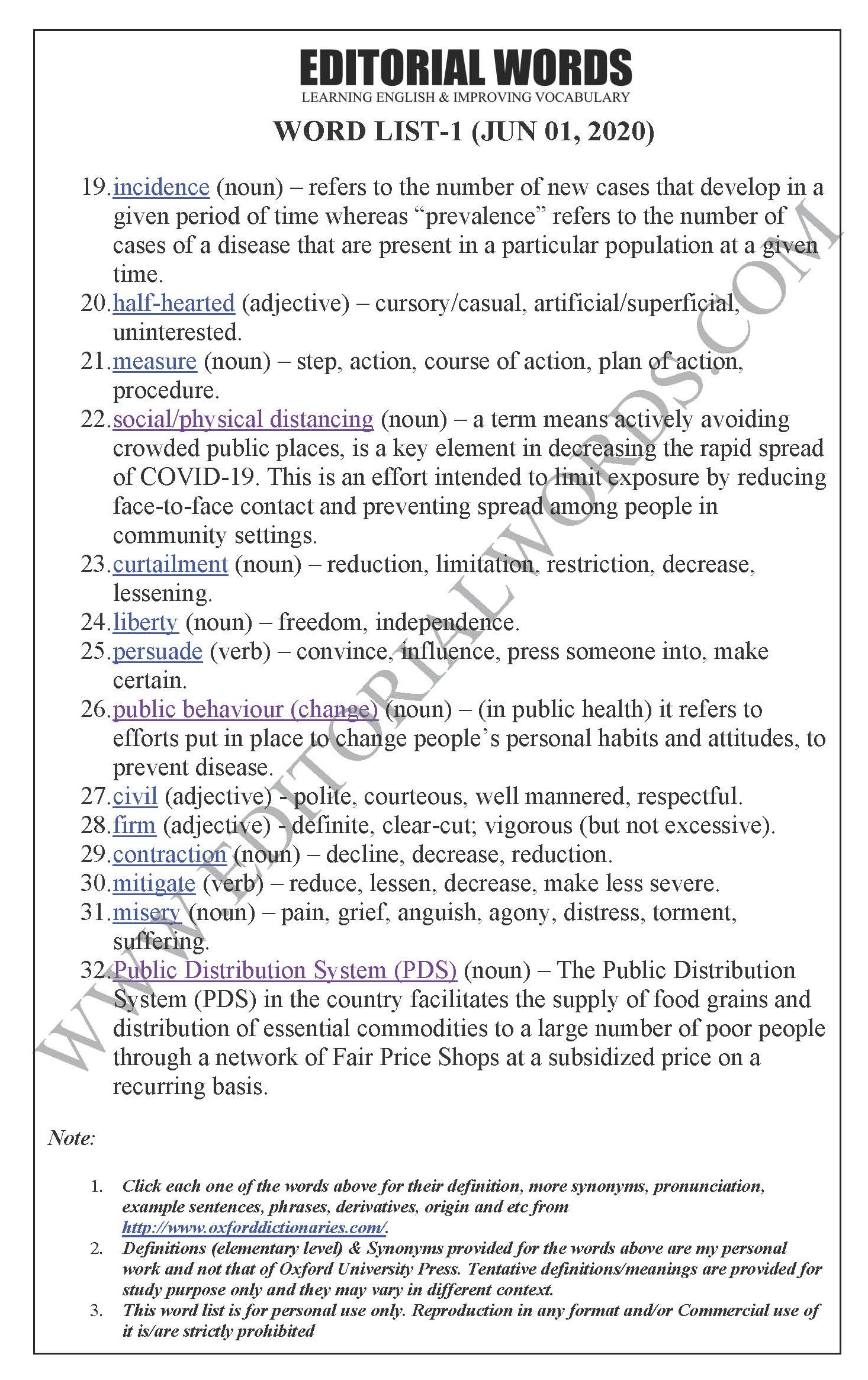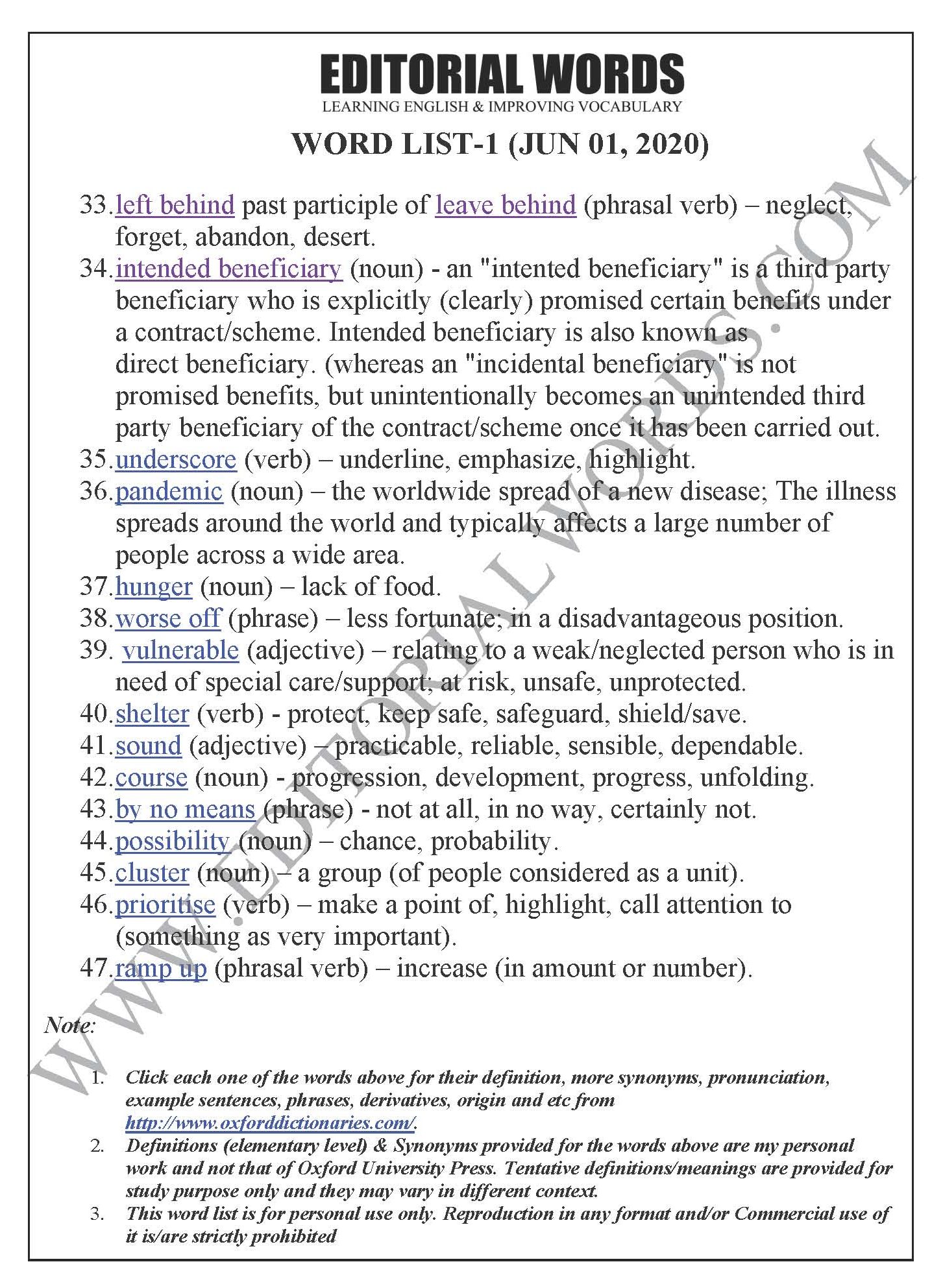The Hindu Editorial (Open with caution) – Jun 01, 2020
It is a truth universally acknowledged now that the severe restrictions to contain COVID-19 produced traumatic,… For further reading, visit “The Hindu”. Below is today’s word list-1 for The Hindu Editorial (Open with caution) – Jun 01, 2020.
To read this article, click here.
This preview is provided here with permission.
Courtesy: The Hindu
Today’s word list-1 for The Hindu Editorial (Open with caution) – Jun 01, 2020
- resumption (noun) – restarting, recommencement, relaunch/restoration.
- vigil (noun) – surveillance, close watch, monitoring.
- universally (adverb) – invariably, globally, broadly/commonly.
- acknowledge (verb) – admit, accept, recognize, realize.
- traumatic (adjective) – shocking, distressing, disturbing.
- displacement (noun) – a forced removal/departure of people from their homes, mainly due to war/natural disaster/persecution.
- check (noun) – control, restraint, curb, restriction/limitation.
- modest (adjective) – moderate, limited, small.
- phased (adjective) – relating to something carried out/performed/pursued in stages; staggered, timed at intervals (of something as they don’t happen at the same time).
- rigorous (adjective) – strict, stern, stringent.
- lockdown (noun) – an emergency protocol implemented by the authorities that prevents people from leaving from a place; An extended state of confinement/encirclement/isolation of a person by the authority.
- set the stage for (phrase) – pave the way for, make preparations for, usher in.
- resume (verb) – restart, recommence, begin again.
- undertake (verb) – begin, start, commence, embark on.
- surface (verb) – emerge, arise, appear, loom.
- unwittingly (adverb) – unintentionally, unknowingly, inadvertently.
- diligence (noun) – carefulness, attentiveness; dedication, commitment.
- quarantine (verb) – separate, set apart, segregate, detach (people, animals and things (such as plants) from others for a period of time in order to control/restrict the spread of a contagious disease). Separate and restrict the movement of persons, who may have been exposed to infectious disease, but not yet known to be ill.
- incidence (noun) – refers to the number of new cases that develop in a given period of time whereas “prevalence” refers to the number of cases of a disease that are present in a particular population at a given time.
- half-hearted (adjective) – cursory/casual, artificial/superficial, uninterested.
- measure (noun) – step, action, course of action, plan of action, procedure.
- social/physical distancing (noun) – a term means actively avoiding crowded public places, is a key element in decreasing the rapid spread of COVID-19. This is an effort intended to limit exposure by reducing face-to-face contact and preventing spread among people in community settings.
- curtailment (noun) – reduction, limitation, restriction, decrease, lessening.
- liberty (noun) – freedom, independence.
- persuade (verb) – convince, influence, press someone into, make certain.
- public behaviour (change) (noun) – (in public health) it refers to efforts put in place to change people’s personal habits and attitudes, to prevent disease.
- civil (adjective) – polite, courteous, well mannered, respectful.
- firm (adjective) – definite, clear-cut; vigorous (but not excessive).
- contraction (noun) – decline, decrease, reduction.
- mitigate (verb) – reduce, lessen, decrease, make less severe.
- misery (noun) – pain, grief, anguish, agony, distress, torment, suffering.
- Public Distribution System (PDS) (noun) – The Public Distribution System (PDS) in the country facilitates the supply of food grains and distribution of essential commodities to a large number of poor people through a network of Fair Price Shops at a subsidized price on a recurring basis.
- left behind past participle of leave behind (phrasal verb) – neglect, forget, abandon, desert.
- intended beneficiary (noun) – an “intented beneficiary” is a third party beneficiary who is explicitly (clearly) promised certain benefits under a contract/scheme. Intended beneficiary is also known as direct beneficiary. (whereas an “incidental beneficiary” is not promised benefits, but unintentionally becomes an unintended third party beneficiary of the contract/scheme once it has been carried out.
- underscore (verb) – underline, emphasize, highlight.
- pandemic (noun) – the worldwide spread of a new disease; The illness spreads around the world and typically affects a large number of people across a wide area.
- hunger (noun) – lack of food.
- worse off (phrase) – less fortunate; in a disadvantageous position.
- vulnerable (adjective) – relating to a weak/neglected person who is in need of special care/support; at risk, unsafe, unprotected.
- shelter (verb) – protect, keep safe, safeguard, shield/save.
- sound (adjective) – practicable, reliable, sensible, dependable.
- course (noun) – progression, development, progress, unfolding.
- by no means (phrase) – not at all, in no way, certainly not.
- possibility (noun) – chance, probability.
- cluster (noun) – a group (of people considered as a unit).
- prioritise (verb) – make a point of, highlight, call attention to (something as very important).
- ramp up (phrasal verb) – increase (in amount or number).
Note:
1. Click each one of the words above for their definition, more synonyms, pronunciation, example sentences, phrases, derivatives, origin and etc from http://www.oxforddictionaries.com/.
2. Definitions (elementary level) & Synonyms provided for the words above are my personal work and not that of Oxford University Press. Tentative definitions/meanings are provided for study purpose only and they may vary in different context.
3. This word list is for personal use only. Reproduction in any format and/or Commercial use of it is/are strictly prohibited.
Today’s word list-1 The Hindu Editorial (Open with caution) – Jun 01, 2020:



“Phrasal Verbs” We Learnt Last Week
“Idioms & Phrases” We Learnt Last Week
“Important Definitions” We Learnt Last Week
Recent Word Lists For The Hindu Editorial Articles

Be the first to comment